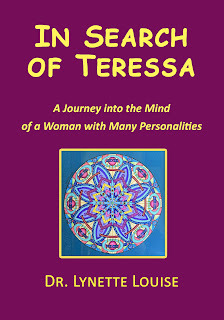Tsara Shelton's Blog, page 2
July 18, 2024
Autism Answer: Communication is Hard But We Can Practice Clarity and Meaning What We Say
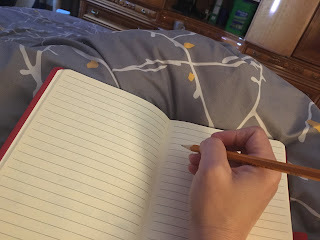 Pencil poised ready to write
Pencil poised ready to writeCommunication is hard. Verbal, non-verbal, written, performed, painted, or otherwise portrayed. English, French, doesn't matter. It's all hard. As a writer I used to feel as though I'd failed when something I wrote was misunderstood. Tens of people would understand*, and then one person wouldn't, and I'd feel I'd failed. I hadn't peaked as a communicator yet. *I was tempted to write "hundreds of people would understand" but let's be honest, I never had hundreds of people reacting openly to my writing. That's okay! It's more manageable this way! How silly of me! Pay attention for any amount of time to the world around us and we see communication is always imperfect, even when done perfectly. Did I think I had some magical power of writing that could transcend all others? <--- no, but I've wished it. All of our readers, listeners, neighbors, family and friends, are engaged in their own interpretations based on experiences, level of understanding or intelligence, specific interests in the moment, mood, prejudices, agendas. We are, they are, the world is. It is one of the wonderful wonders of attempting to communicate. And it is also one of the hardest parts. Having four autistic brothers who were impacted by the disorder in varying degrees, I grew up craving some sort of device that would allow me to understand them. And for them to understand me. "I love you, but please stop jumping and screaming and making everyone stare at us," I wanted them to know. "Why do you wrap your lips around hot tailpipes?" I wanted to understand. The jumping and screaming, the lips on hot tailpipes, there were reasons for those (confession: my mom had to teach me that. I actually thought the reason was "they are autistic" and am forever grateful that my mom insisted we explore further) and there were reasons for them to learn which were okay where and which were terribly dangerous. But, communication is hard. For absolute certain, though, it is worth practicing. It is worth teaching. It is worth honing. There is a saying: It isn't enough to write so you will be understood. You have to write so you can't be misunderstood. It is a lovely idea, but if you gauge your ability and success as a communicator by needing to be entirely and always understood, you will lose. Debates about the meaning of words and art by the greatest communicators are forever engaging interested minds. Not because the communication was poorly executed but because we all understand different things differently. It is a guaranteed product of this desire we have to connect! I think, instead, it is worthwhile to communicate with clarity. To practice being clear and meaning what you say. To not adjust the meaning in order to be applauded or appreciated, though we will adjust the methods and style. There is a Lily Tomlin quote I love: We are all in this alone. It reminds us we are all here, but we are never able to not be alone in ourselves. At least, that what it communicates to me. Who knows what Lily Tomlin actually meant? Maybe not even Lily Tomlin! That's the other thing. We can be clear, we can say what we mean and then change and grow and no longer know what we meant. But now, in this moment of infinity, as we try to communicate, we can practice being clear and meaning what we say. And that is what I'm trying to say. I mean it. Hugs, smiles, and love!!
Autism Answers with Tsara Shelton (Facebook)
June 22, 2024
Autism Answer: Inclusion - My Brother, Dar
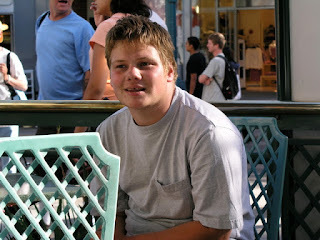 My brother, Dar
My brother, DarThe book my mom wrote with and about Teressa (a woman in California diagnosed with Dissociative Identity Disorder) includes so many interesting personalities. Some speak from beyond the grave. Some speak from holy text. Some speak from within the fractures of Teressa herself. One personality remains steadfast and supportive, often at mom's side, and it is that personality I want to draw attention to: my brother, Dar. During the course of writing this book and living on Teressa's property, Dar and mom have worked together. Dar's lack of words has never equaled lack of communication, and in this memoir he speaks clearly. He steps back when people need mom to focus on them, he reaches out when they need a light touch, he is a sounding board for mom as she works to illuminate issues and consider moral conundrums. He is there to hug her when she cries and then to remind her of her strength. The way my mom and Dar work together is a hard core real life example of the power of inclusion. Inclusion is a collaboration. It is not: put your own needs aside, move over and make accommodations. It is not: fit in, don't show up if it's going to inconvenience others in order to assist you.
Inclusion is collaborating to accommodate and assist each other in the direction of a common goal: living our full lives.
When you read In Search of Teressa you will feel the power of that collaboration. And you will be rewarded. Hugs, smiles, and love!!!Autism Answers with Tsara Shelton (Facebook)
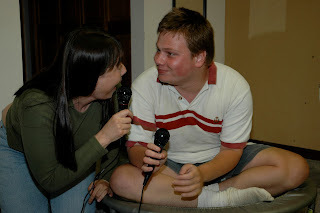 My mom and my brother, Dar
My mom and my brother, DarYou can see all of my mom's books, including the one I am referring to in this post, on her websites: www.lynettelouise.com www.brainbody.net
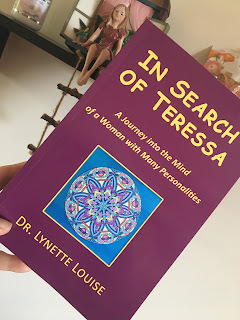
May 29, 2024
Book Review: In Search of Teressa: A Journey Into The Mind Of A Woman With Many Personalities by Lynette Louise
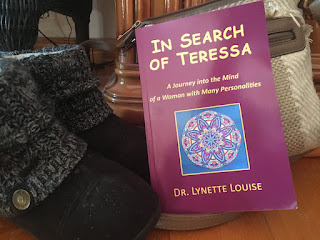
Background: My mom wrote this book. Actually, she talked this book into audio recordings, sent them to me to transcribe, then read it to Teressa who made a few clarification requests, then made those changes and sent it to all the people talked about in the book for their thoughts and requests, then made changes, then allowed an editor and publisher to play with it, then helped design a cover, and then it was published. But, ya. My mom wrote this book.:D
My mom has been writing since my earliest memories (hers, too). She writes poetry, songs, academic abstracts and articles, books, shows, theater, and comedy shows. Almost always her stories are created with the intention to inspire and teach, to learn and grow, to surprise and submit uncommon perspectives. Almost always she writes stories based on her own life and those of us closest to her.
This new book is her first written through the lens of someone else’s life and memories.
In partnership with Teressa, a woman who has been diagnosed with dissociative identity disorder and has been suspected as having anywhere between twelve and twenty-three alters (alternate personalities), In Search of Teressa is written in two parts.
The first part describes Teressa's memories. Her childhood, her life as a wife and mother, her attempts at creating and discovering herself as a woman via retreats, counseling, and religion. It is written from Teressa's point of view, from her idea of how it was and what was done. There is a childhood of malnutrition, alcoholism, physical illnesses, and memory loss. There is an adulthood with murder, true love, family vacations, and alters.
Her storyis not told chronologically, and actually begins with the murder of her adultdaughter. As readers bounce back and forth from Teressa’s later years to herearly years and back again, it is reminiscent of how Teressa’s life is lived inher mind. A continuous bringing to the present slights from her past.
The second part of the book is my mom's story, alongside Teressa. It includes my brother, Dar, who is autistic and almost always at her side. My grandchildren are there. Mom interviews the people in Teressa's life and they are mostly accommodating.
During mom's first meeting with Teressa's brother he sits in the sunshine outside of the house with the door open while mom and Teressa sit inside. It was during the COVID-19 lock-down and I suppose accommodations were the norm, yet it is a memorable scene: socially distancing siblings discussing a childhood of playing dick detective (hiding in the backseat of their drunk dad's car to see if he cheated on mom, per mom's orders), sharing one onion between them and feeling tangible guilt over not sharing with the other children, putting poop in the backyard cesspool due to broken pluming, and so many other memories. Often their memories would match in terms of what happened. Often, though, they would disagree on the reasons, the meaning, the why or message of the memories.
My mom is an international brain and behavior expert so she is qualified to understand what is going on in the brain and how it is influenced by the people guiding it as well as by the body it is in. The hormones and chemicals as well as the story it is being told. This second part of the book is the piecing together of Teressa's truth as mom helps her find the path to becoming one unique person.
There are many parallels in the lives of both my mom and Teressa, yet the people they become have stark differences. This is something that shines throughout the book. The hand we can play in creating ourselves even as we are not in control of all the elements.
By the endof book two my mom and Teressa have made giant strides toward a unified Teressa,a happy Teressa, and made plans for ever more growth. Along the way, readerslearn much about how memory works, how we are building ourselves with thebeliefs we hold, how we can take advantage of the brain’s plasticity for ourown benefit by purposely changing certain behaviors, and how we can be kinderto each other without being so supportive we push our loved ones deeper into unhealthymental states.
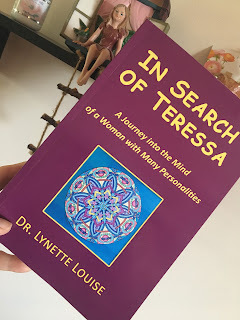 The entire book is fantastic. It is engaging and informative. It is poetic and scientific. It answers and asks. It is a story that makes us question our own memories as it tells us how to remember.
The entire book is fantastic. It is engaging and informative. It is poetic and scientific. It answers and asks. It is a story that makes us question our own memories as it tells us how to remember.I highly recommend this one!
Follow this link to view the book on Amazon: In Search of Teressa
Hugs, smiles, and love!!Autism Answers with Tsara Shelton (Facebook)
May 24, 2024
Autism Answer: There Is Nothing, Until There Is Something
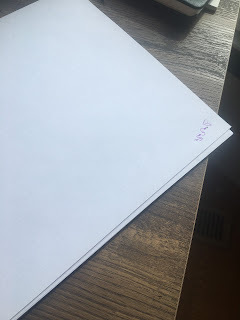
There isnothing, until there is something.
When I was aboutten I had a best friend named Rayna. We both strongly hoped to become wondrouswriters one day. We had similar wants from the writing we imagined one daypublishing. We wanted to be recognized as wise; as people who could use wordsto disturb readers into feeling and thinking differently; as writers who were special,spectacular, and unequaled.
Ourreactions to blank sheets of paper, however, were drastically dissimilar. Andher reaction, I confess, shocked and almost offended me.
I wouldstare longingly at the sheets, caress them first with my eyes, then my soul,then my fingertips. I would fall into the nakedness of those sheets, usuallywhite or off white in colour, and I would imagine being someone who couldprovoke those pages toward brilliance; the one writer who could commune withthe truth living within each unique page; craving to be the one author whocould unearth it, coax it into the light. It would pain me, that desire. Thatneed. Sometimes, when I was brave, I would find a pretty pen and draw a tinyheart in an upper corner, or a small tangle of vines, as is still my habit. (Iam now 50.)
Rayna, bycontrast, would take the strongest pen nearest and scribble angrily all overthe page. Her passion was clear, her need was tangible, her pleasure mixed withpain was on display. “I have to, it’s mocking me, I have to,” she would besaying. Maybe not those words, but that sentiment. It hurt me to see. I couldn’tunderstand. Even as she explained, even as she matched the intensity of feelingI had toward the same blank sheets, her action was simply unfathomable to me.
But I wanted to write, and I wanted to understand, and Iwanted to be all the characters.
So I tried.
We were best friends for only a year, but I remember ourfriendship often. I remember her need to scribble strongly, to take over, totake action on the intense feelings, often. I remember the size of my desire, mybelief in an immensity waiting to be discovered, my fear of ruining it, often.
I recognize both of us in others, now. I see how we areoffered a stimulus (something presenting itself, something happening) and howwe reach into the same grab bag of emotions (desire, dread, joy, fear, anger,love, worry) and how we take an action in response.
We so often don’t choose the same reactions, and we so oftendon’t understand each other, and we so often don’t try or want to.
There is nothing, until there is something.
I think it matters that we pay attention to and reflect onthe something we make out of nothing.
Hugs, smiles, and love!Autism Answers with Tsara Shelton (Facebook)May 15, 2024
Autism Answer: Even When We Walk Away, We Participate
It is a wonderful practice to unplug and walk away from media influences. Yet, even when we choose to unplug and rejuvenate without the direct influence of television, social media, or tabloids, we are still incapable of not being affected. The people we speak to, the properties we live in, the land we play on, the work we do, the money we spend, the food we eat - the list of ways we are forced to participate in artificially created systems bigger than ourselves is practically endless, and always evolving. I think this does not mean we must then spend our time on the inside. In my experience the more time I spend unplugged and away from the focused news, information, and opinions, the better I am at actually digesting and considering them. Of thinking bigger than only them. Also, though, I do like to spend some time being informed. I think I am more thoughtful when I learn from these things that attempt to persuade me. I go through the world as only me, with my looks, abilities, finances, sensory sensitivities, etc. So, I rely on the writing and speaking of others to better consider and to learn more. It's nice to walk away and unplug. To be without direct arguments, opinions, or even information. To simply allow myself to conjure the information that grows naturally from myself. But I cannot pretend it is information grown only from myself. It is always informed by the flora and fauna of my environment. I can largely choose my environment, even help create it, but I cannot coerce or deny it.
Hugs, smiles, and love!!Autism Answers with Tsara Shelton (Facebook)
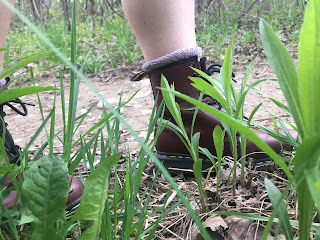 My boot on the ground in nature
My boot on the ground in natureMay 11, 2024
Autism Answer: New Memoir Examines the Paths that Lead a Woman to a Diagnosis of Dissociative Identity Disorder
Malnutrition, MemoryLoss, and Multiple Personalities
This month Robert DReed publishing will be releasing the book In Search of Teressa: A Journeyinto the Mind of a Woman with Many Personalities, written by renownedauthor and neuroplastician Lynette Louise, aka “The Brain Broad." aka My Mom!
It is my mom’s eighth published book and her second book published with Robert DReed publishing. Her first with them was Miracles are Made: A Real Life Guide to Autism - back then the company was run by Robert and his wife, Cleone. Robert has since died and Cleone is now the editor and publisher, and an author herself. I worked with Cleone on the editing of this book and admit that I sort of feel like we've established a sisterhood. Not just me and Cleone, but me, Cleone, mom and Teressa.
My mom has been writing since my earliest memories (hers, too). She writes poetry, songs, academic abstracts and articles, books, shows, theater, and comedy shows. Almost always her stories are created with the intention to inspire and teach, to learn and grow, to surprise and submit uncommon perspectives. Almost always she writes stories based on her own life and those of us closest to her.
This new book is her firstwritten through the lens of someone else’s life and memories.
The book was writtenat Teressa's request. Teressa is a woman who - in adulthood - was diagnosed with DissociativeIdentity Disorder (known colloquially as multiple personalities) and who hasspent much of her lifetime searching for the answer to a self-proposedquestion: “Whose fault am I?”
With mom’spenchant for scientific seeking via outlier thinking and poetic prose, herexploration of this question is at once academic and wondrous.
The book contains twoparts.
Part one is written directly from Teressa’s own memories andversion of things. The story unfolds in the fashion of fiction. Readers dive in and are introduced to the unreliable power of memory and itssignificant role in the creation of who we become. Memory issues plague Teressafrom her early childhood and onward. She also suffers from a variety of physicalailments stemming from unexplained sources. However, it is not until her adultyears, as a wife and mother, that she is diagnosed with DID. Nature vs nurtureis on display as Teressa’s brain function is influenced by malnutrition, abuse,religion, retreats, and a love story that takes such careful care of her itbecomes unhealthy.
The second part of thebook brings the author’s voice and observations to the forefront. As aninternational brain and behavior expert, my mom is experienced andthoughtful. She is there to write Teressa’s book, but also to help Teressabetter understand herself and to take some control of her own healing. Livingwith her adult autistic son, my brother Dar, mom stays in the apartment aboveTeressa’s garage. Interviewing family, friends, and counselors, while siftingthrough documents, medical records, letters, and thousands of journal pages,the ways in which Teressa and her “alters” (alternate personalities) grew to bewho they were by the time of my mom’s introduction to her is teased out.
Instructively, but also painfully, the ways in which professionals werepotentially culpable in the deteriorating of Teressa’s mental health begs to berecognized. This kind of breaks my mom's heart. One of those professionals is a dear friend and colleague of mom's. She loves her and owes much of her own career to her. She helps reverse her friend's Parkinson's symptoms while her friend lets her work under her license. They adore each other. Yet, the more she learns from Teressa and those around her, the more of an ethical conundrum she finds herself wading in. All of this she shares with readers.
"The story of this one woman's life," my mom said to me on the phone, "demonstrates the degree to which our medical choices shape our past, present, and future."Following clues,experimenting with kindness, keeping an open mind, these are at the heart ofboth science and art. This book utilizes these tools and engages readersbecause of it.
Throughout these pages my mom marvels at the parallels between their lives. My mom has a history that is similar to Teressa’s. Including a flirtation with similar diagnoses, in her youth.
However, the two women ultimately ended up with very different minds.
“I want readers tocome away with a recipe for how to live a life that improves, moment tomoment,” mom says regarding a key takeaway from her latest book. “A recipefor improving regardless of your history or situation.”
Bothscience and art do their best work when keeping an eye on the question they seekto answer, particularly when there is a willingness to adjust it. “Whose fault am I?” was not a healthy question for Teressa.
“Do youwant to be one unique person?” my mom asks Teressa on the page. When Teressa consistentlyand vigorously answers yes to this question, it is answers to that question my mom consistently and vigorously guides her to seek and find.
How do we move from being a woman with over twenty alters to becoming one unique person?
Though a diagnosis ofDissociative Identity Disorder is not common, it is intriguing. Surprisingly, it is also relatable.
Despite so much of Teressa’s story beingunique to her, a woman who is unstable to the point of presenting “alters”(alternate personalities), it is consistently familiar. Places where Teressachooses one way to think vs another, I have been there. Most people - particularly women - have. Mostof us just followed a different thought or behavior bringing us to a differentplace, a different state of mind.
As is the power of all great science and art, In Search of Teressa tells Teressa’s story while reflecting for readersaspects of our own.
It will be available to purchase via online bookstores (Amazon, Barns & Nobel, Powell's) at the end of May 2024.# # #
May 4, 2024
Autism Answer: Love is not a Tornado
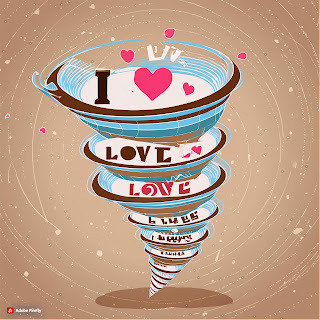 A tornado with hearts and the words "I love": image by Ian Langtree (my soul mate!)
A tornado with hearts and the words "I love": image by Ian Langtree (my soul mate!)Love is like a tornado.
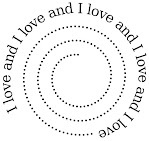
I love and I love and I love. My sons. My grandchildren. My mom. My sisters. My brothers. My friends. My soul mate. My nieces. My daughters-in-law. My step-daughters. I love and I love and I love. It is unpredictable and intense. It drops where it will and it tears things up. I cannot make it obey me, I cannot demand that it is tender with the people I care about. Love is not a tornado. It does not cause destruction most of the time. Instead, it creates. It connects me to meaning, to the deeper strength and substance inside myself. Because of the variety of people I love, because of my desire to feel close to them, I stir myself up inside to uncover hidden possibilities of understanding or empathy. Where I find none I am often able to plant a seed and grow something wonderful. Love is like a tornado. When people I love hurt, it tears me up. It is unstoppable and natural and entirely horrible to hurt the way it can hurt. It is unfair. It is violent. Love is not a tornado. I love and I love and I love. My sons. My grandchildren. My mom. My sisters. My brothers. My friends. My soul mate. My nieces. My daughters-in-law. My step-daughters. I love and I love and I love. It makes me more. It makes me bigger than myself. I cannot experience so much of the world in so many different ways without those I love living life and sharing what it is with me. They share, I share, we consider each other's ideas and observations, we grow and gain because of it. A tornado is a violently rotating column of air most often quantified by the amount of destruction it leaves behind. Love can be like that. But love is not that. Love is a connection that allows for freedom. That would fight for that freedom. While, simultaneously, fighting for changes when who you love - yourself or the other - would be better with change. Better for you? For them? This is the tough stuff love signals us to think about. There is so much involved it can feel like a tornado. But love is not merely destructive and dangerous when it is active. Also, it is soft and sweet, it is the breath of a baby sleeping soundly in your arms; it is strong and supportive, it is the sister who shows up with an industrial air conditioner when you can no longer take the heat; it is honest and kind, it is the mother who tells you to do the dishes with your brother, not for him, because though it takes longer and seems like a skill your brother will never have, you are wrong and he is worth the time it takes both of you to learn that.
 I love and I love and I love. My sons. My grandchildren. My mom. My sisters. My brothers. My friends. My soul mate. My nieces. My daughters-in-law. My step-daughters. I love and I love and I love. Loving people is hard. It can be easier to just not do it. Sure, it brings brightness and beauty, but so does a sunrise and that is less likely to cause emotional turmoil. Love is like a tornado. As are most of our human emotions. States of uncertainty, tumultuous and worrisome, unpredictable and unconfined. But love is not a tornado. Love is the hardest most beautiful thing you can do with your tumultuous tornado like emotions. Don't be afraid to unleash love upon yourself and those who are worth the wonderful exhaustion and vulnerability of it. Like a tornado. your love can reach the clouds, command attention, and influence the landscape. Do that. Hugs, smiles, and LOVE!!! <----- not a tornado.Autism Answers with Tsara Shelton (Facebook)
I love and I love and I love. My sons. My grandchildren. My mom. My sisters. My brothers. My friends. My soul mate. My nieces. My daughters-in-law. My step-daughters. I love and I love and I love. Loving people is hard. It can be easier to just not do it. Sure, it brings brightness and beauty, but so does a sunrise and that is less likely to cause emotional turmoil. Love is like a tornado. As are most of our human emotions. States of uncertainty, tumultuous and worrisome, unpredictable and unconfined. But love is not a tornado. Love is the hardest most beautiful thing you can do with your tumultuous tornado like emotions. Don't be afraid to unleash love upon yourself and those who are worth the wonderful exhaustion and vulnerability of it. Like a tornado. your love can reach the clouds, command attention, and influence the landscape. Do that. Hugs, smiles, and LOVE!!! <----- not a tornado.Autism Answers with Tsara Shelton (Facebook) April 23, 2024
Autism Answer: He Smiles in his Sleep
 the sun rising, reflecting on the river, across the street from our house
the sun rising, reflecting on the river, across the street from our house “Snuggle bug, Shay Shay, you awake?” I ask quietly, crouched on my haunches beside him where he sleeps on the floor in our basement. My twenty-six year old son makes a small sound in response. I lean in closer to rub his shoulder and see his face. His eyes are closed and the softness of sleep is settled on him like fairy dust. I see a comfortable smile settled on his lips. My second youngest son is smiling in his sleep. Rubbing his shoulder I speak again, a little louder this time, “It’s 6:45, you gotta get up for work.” “Rugga bugga, baby boops,” he replies. This is a common reply from him. It most closely translates to, “I heard you.” There is movement now, he shuffles a little under his weighted blanket, his eyes remain closed and the smile does not fade. “I’m going to go upstairs and make coffee. See you in a few minutes Shay Riley Bones,” I straighten up carefully, trying to use my muscles purposely and to take advantage of every movement. I like to use life as my exercise room and every movement is an opportunity to stretch, strengthen, or simply care about my body. Also, I don’t want to hurt what I have always called my “old lady knees”. I am pretty much fifty years old now, but these have been my old lady knees since my elementary school track and field days. “I like coffee,” Shay says as I slowly walk away toward the stairs that will lead up to our kitchen where organic shade grown fair trade coffee beans await to be ground and brewed. I love these mornings. I love making coffee while beneath me my second youngest son unfolds his giant body, stretches out of his bed on the floor (his preferred place to sleep) and gets ready for a job he feels competent and appreciated in. Meanwhile, above me, my soul mate showers in preparation for a day working at home, sitting focused at a computer that is next to mine, accepting a slightly annoying onslaught of obsessive touches, squeezes, and smooches from me. I love standing in the kitchen, lights off surrounded by shadow, while my gaze easily consumes the sunrise kissing the river outside our front room window and the cats meow for their specially made milk and morning affection. I love this spot where I can be in shadow while watching and feeling the world unfold via its morning routine. The house is big, but each room offers such specialness I don’t mind the size. The coffee beans have been ground and are steeping in the French Press. I set my adorable cube timer to the perfect four minutes (this timer is one of my favourite gifts given to me by Ian, the soul mate I moved in with only a few years ago) and take myself to the front room to stretch a little. Four minutes of random stretches in front of a window facing the river. Lovely. The timer beeps, upstairs I hear the shower turn off and imagine my soul mate toweling himself in our en-suite bathroom, I stand straight and smile. I remember seeing my son smile in his sleep, and I am overcome with a sense of gratitude. This home, this life, this morning routine that brings me such joy, is a gift. Another favourite gift given by my soul mate. A gift given to us. Invited into his home we – my second youngest son and I – have carved our space in it. The basement is my son’s domain, where there is a kitchen, a bathroom, washer and dryer, a pool table, a bar, a sauna. He is not dwelling in darkness and brooding, though he could if he chose. Some days I’m sure he does. But for the most part, he works, he plays his games and watches his shows, he listens to music and bounces around, smiling easily. My domain is sort of everywhere. I have a dance room where I can turn the music up, close my eyes, rock out and imagine myself alone in but also at one with the universe. I have roller skates and headphones for summers outside around and around the pool. I can spend hours listening, singing, and skating in circles. There is the car where I take people places and go to the grocery store, where I listen to French radio stations and practice saying and singing the words. But mostly, my domain is beside Ian. My soul mate. I follow him around unnecessarily. This is a big house and there are many rooms, the outside is sizable too and there are many delicious spots to sit and read, think, and write. But mostly I follow him around, often with a coffee in my hand, and mostly he doesn’t mind. We – my second youngest son and I – love living with Ian. We miss the ease with which we used to have access to the rest of our family, now that we are here in Quebec and they are still there, mostly in California. We have feelings and challenges that are hard, that hurt, that we must deal with. We work to be our best selves and to discover how we can best pitch in, how we can best take part in creating an environment that includes our influence, insights, and work. We struggle to know how we can be helpful without being underfoot or overstepping. But we are graced with a man who opens his home and requires very little from us. I do the driving (though I don’t pay for the fuel). My son pays rent (enough to feel good about pitching in while still paying far less than he would elsewhere). We are living in a situation where we play a part and ask for responsibilities yet are asked to do little beyond taking care of ourselves. So though we are human and have human hardships, we are also humans with less hardships. I sometimes wonder, should we work harder? Worry harder? Are we wrong for finding joy in this easy life gifted to us? Should we be more? Are we missing something and burdening others without knowing? Are we unfairly happy? Maybe so. Maybe so. But I will not deny the perk of this place we are in. My second youngest son smiles in his sleep. Hugs, smiles, and love!Autism Answers with Tsara Shelton (Facebook)
April 15, 2024
Autism Answer: Allow, but also Push - aka Old Lady Wisdom
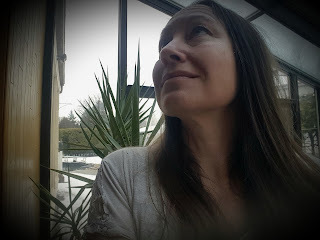 Me trying to show my age but also using the vignette feature to try and make the photo look cool and not just like I'm trying to show my age :D
Me trying to show my age but also using the vignette feature to try and make the photo look cool and not just like I'm trying to show my age :D Ever since I was a little girl I've enjoyed the feeling of picturing myself as an older woman. More specifically, I'd imagine myself as a wise older woman with a smile, an approachable kindness, and a life alone in the woods. I would push myself in that direction. No rush, of course. I like enjoying all the states I'm in while I'm in them. But I would imagine my older self with a happy anticipation. Interestingly, I never imagined myself feeling older. Now, as I'm enjoying my 50th year, I am noticing that the feeling older is something worth paying attention to. No, I do not want it as badly as I want to look older, but I also do not want to hate it. I want to allow my age while I push in the direction of feeling great in my mind and body. I want the privilege of being older and I want to embrace it holistically.
Which means celebrating the appearance, cultivating the wisdom (which my little girl self, with her lack of wisdom, had assumed simply happened when you got old), and focusing on the way I feel.
My focus on how I'm feeling is to better understand others and to have more of those spectacular, "Oh, now I get it!" moments I continually crave. I freaking love stepping into a new understanding.
Also, though, it is related to my desire to be an active participant in my own evolution. I want to feel myself age while I explore what that means for me, and while I challenge what it could mean for me. I want to be strong in my refusal of certain elements while being brave in my acceptance of others. I want to decide where to be strong and where to be brave as the evolution continues. I want to do this in real time, not predetermined. Not unthinking. Unaware. Unkind.
It is a valuable skill, knowing how to both accept and push against. My mom exampled this fantastically with my autistic siblings: they were to be accepted and allowed to be themselves while also pushed in healthy directions, growth, and skill acquisition. Each of my mom's children (there were eight of us) were unique. Which meant there had to be flexibility and understanding of where one could be pushed while another ought to be accepted. We grew up in a home that knew we were all equal but not the same. We knew not to judge each other for which skills we chose to work on, which feelings we insisted on finding, which challenges we chose to accept and rise to meet.
So, yes! I will allow age to enter me everywhere. The little girl in me claps with appreciation over how far we've already come and bounces with excited anticipation over what awaits. (Although she might be a little disappointed at how long it's taking the wisdom fairy to give us our old lady wisdom magic. tee hee!)
As I allow I will also insist. I will insist on pushing toward my own version of how age feels in my body. Push, but also allow. Allow, but also push.
Because I am old I am wise enough to know this is worth doing.
 Hugs, smiles, and love!!!Autism Answers with Tsara Shelton (Facebook)
Hugs, smiles, and love!!!Autism Answers with Tsara Shelton (Facebook) April 2, 2024
Autism Answer: Just a Woman
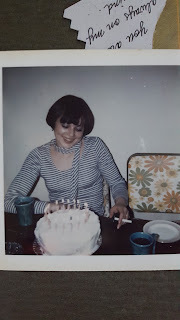 My mom
My mom Everyone is born equal and deserving of respect, celebration, and love. That is true. But, it is also true, some people stand out and are wholly uniquely worthy of particular attention. My mom is one of those people. Her brain works differently and always has. As a little girl synesthesia caused her to say and do things that had an angering affect on many around her. Her innate ability to see unfairness - particularly where misfits and outliers were concerned - and to INSIST on change was not universally welcomed or recognized. And though she was different, she was also just a little girl. My mom works hard, always has. Before most of us would consider her old enough she was babysitting consistently, a go-to for "problem" children and/or disabled ones. She left home at 15. She sewed her own clothes and worked as a car-hop for A&W. She worked in the mall as a gift wrapper and if she needed something she found a way to get it for herself. She went to auditions and wrote screenplays. As a single mom she ultimately raised eight kids, six adopted and four with autism. She was a hands on mom always there for us and insisting we could gain skills and be happy, meanwhile she was also an entrepreneur working constantly to feed and house us. To feed and house us well. She even found ways to work while sleeping, the small number of hours she was able to sleep. Though she worked hard, harder than many if not most, she was still just a young woman, a young mom. She is creative, always has been. From her youngest years she was writing poetry and songs. Attempting to use lyrical language to make sense of a world that didn't make sense. Everyone deserves love, yet that was not what she was seeing. She was seeing abuse that was often unintentional, but abuse non-the-less. She felt certain that if she could craft the right story, the right imagery, the right song, people would notice and the world would change. As she grew older she gained more perspective and more inspiration, and she continued to create with the intention of understanding and instigating positive change. And though she has always been creative, she has also always been just a girl. She is strong, always has been. She could impress people with her physical strength but even more impressive was her emotional strength and certainty. If mom saw injustice, if mom believed in possibilities and rights for people who were easier for society to set aside, to pat on the head and pity, or to simply hate, mom stood strong. I don't know where her confidence came from, I suppose her different brain played a starring role, but whatever it was she went to bat for so many others. Despite becoming continuously a target, she went to bat. It is impressive and so many are lucky because of her. But though mom is strong, she is also just a woman. Just a woman. Not more or less than other women. Just a woman.
 my mom
my momThis, I think, is part of what makes my mom, and people like her, so challenging to some. Because she is not an alien, she did not come from a world where her species can magically see what needs to be done to protect children who are abused, to accept people who are different, to create new beliefs and presumptions in order to build an environment meant for more of us to thrive. No, she's just a woman who is, yes, a little bit different, but also yes, from the same world as the rest of us. A confusing world that wants women to be everything and nothing all at once. Today is my mom's birthday. Today, she is still being different, hard working, creative, and strong. When she wakes up most mornings it is alongside three of my five grandchildren, the three she is helping raise. It is not far from my brother, Dar, who is severely autistic and her right hand man. It is in a small loft, an apartment in the back of a house where a woman with DID (dissociative identity disorder) lives and relies on my mom for so much - neurofeedback, therapy, friendship and more. It is in a room with one dog, one fish, and one guinea pig. When she wakes up on her birthday today, it is surrounded by many things of her making, things she brought to herself via being different, hard working, creative, and strong. But it is also as a woman. Just a woman. More than anyone I know, my mom merits celebration. Not because she is more than anyone I know, but because she isn't. What she does, how she behaves, who she is, it is all impressive beyond measure. And she does it all despite the truth that she is just a woman. I love you mom. You are more than just a woman to me, but I also recognize that you are just a woman. (Which, you know, kinda sucks because I can't use the excuse that I am just a woman when I want to not be strong, hard working, different, or creative.
 ) Happy Birthday!!!!Hugs, smiles, and love!!!!Autism Answers with Tsara Shelton (Facebook) NOTE: If you want to celebrate my mom on her birthday, I recommend Living with Lynette! The show where many of us star as ourselves - though I play the role of a neighbor - and we all giggle at the barely fictionalized true story of our home!
) Happy Birthday!!!!Hugs, smiles, and love!!!!Autism Answers with Tsara Shelton (Facebook) NOTE: If you want to celebrate my mom on her birthday, I recommend Living with Lynette! The show where many of us star as ourselves - though I play the role of a neighbor - and we all giggle at the barely fictionalized true story of our home! 
